Intercultural Marriage: A Ukrainian and a Venezuelan
26 October 2023
“When you have one foundation, one love, one goal, the difference in culture ceases to be important”: Ukrainian missionary in Venezuela
Yulia Ostapchuk was born in Kherson. She spent her youth at the end of the Soviet Union, which collapsed in front of her eyes, leaving people broken, desperate and without hope for the future.
In the difficult 90s, at the age of 17, Yulia was lucky enough to get into an English and secretarial course. Little did she know that behind this “accident” was God’s plan for her life, international service, and a move to a country she had never heard of.
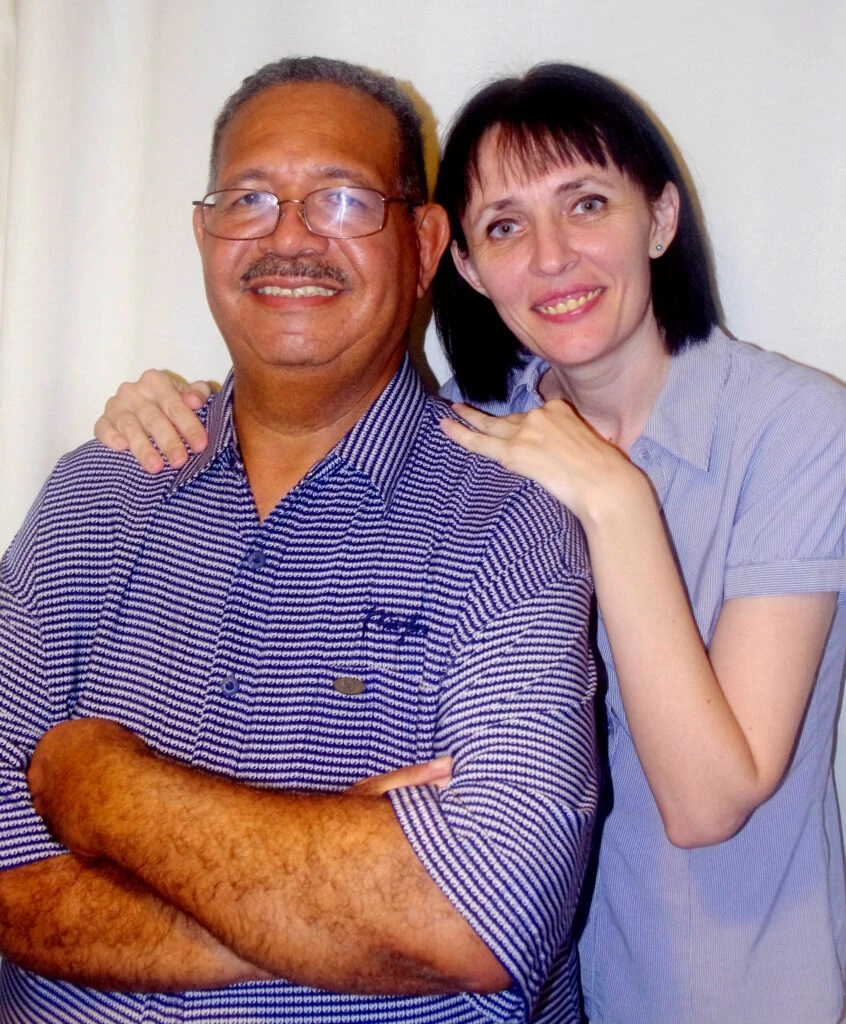
This year, Yulia and Henry, a Venezuelan couple, celebrated 27 years of marriage. The couple has lived in Venezuela for more than a decade. Today, they help minister to children from poor neighborhoods in Caracas.
In this interview, Yulia tells us about the story of how they met and got married, the cultural peculiarities of Venezuelans, and what is important in an international marriage.
Could you tell us about how you met your future husband?
It all had to do with my classmate and my desire to practice my “newly learned” English. The story goes back to 1989, when I was 14 years old and met for the first time a believing girl from an evangelical church.
All my knowledge about God at that time consisted of the following experience: in the second grade I found my baptismal cross from my mother and dared to come to school with it, and when it was discovered there was a terrible scandal, I was reprimanded by the principal himself.
My mother said that there is a God, and I believed my mother, but my older brother said that there is no God, that Gagarin went into space and did not see God, and I always argued and fought with my brother, and I did not believe him.
Besides all this, besides eggs, Easter cakes, and the Orthodox Church, I was told that there were “shtundas,” Baptists who did terrible things in their houses, by turning off the lights. As a child, when I drove past one of the oldest houses of prayer in Kherson, I used to shrink in my seat with inexplicable fear.
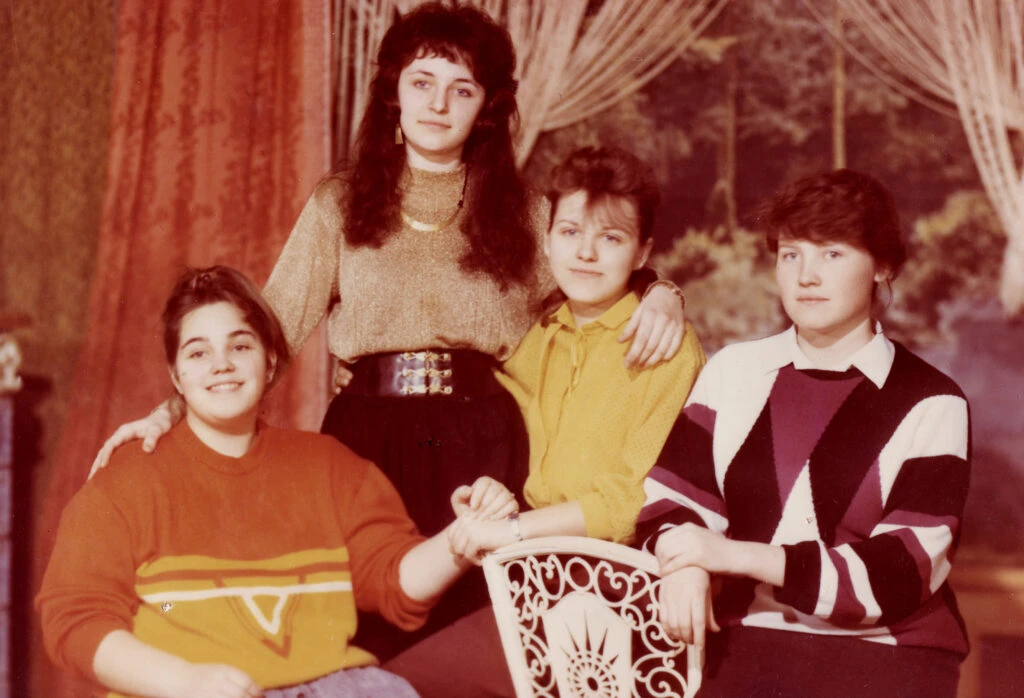
And now, in college, during the atheism class, my classmate began to speak fearlessly about God, openly contradicting the teacher. Later I gave her a book about atheism and the evidence against her faith. I did not accept her words then, I went my own way, but we did not stop being friends and communicating.
The 90s came, difficult times, dreams shattered, stereotypes broken, idols fallen, and everything taught turned out to be a lie: blacks in cardboard boxes in American slums did not suffer, and Lenin was a nit and a murderer.
The economy was going to hell, we sold everything we could. It was winter, and I had the idea to sew and try to sell a fur coat of an unusual model, using scraps of fur and my mother’s old doodle coat.
It turned out so well that I got a lot of money for it. I used some of that to pay for secretarial and English courses.
I studied, and one day I met my believer friend again. The year was 1993. I was 18, and she invited me to a church service in a tent where there would be foreigners, especially a mulatto who sang well.
So I went, first to see foreigners, which was very rare at that time, and of course to practice English I had learned but could not use, understand, or speak.
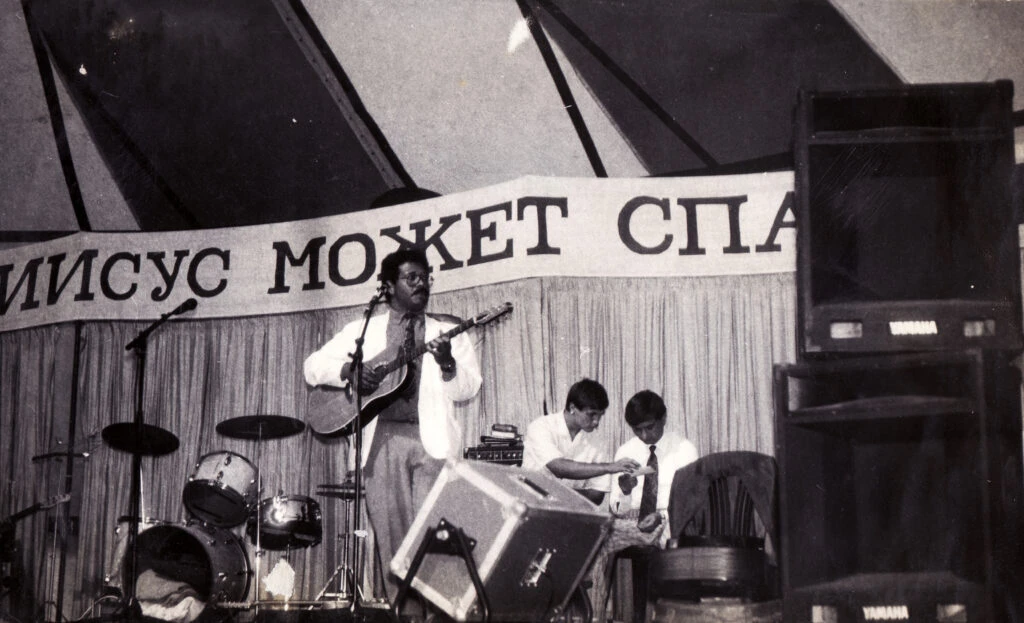
In the tent, the Lord touched me and saved me, and there I met Henry, the mulatto who sang well. Interestingly, I had never heard of his home country, Venezuela.
In Soviet times, people talked more about Cuba, Argentina, and Nicaragua. Venezuela was capitalist and therefore unpopular.
How did you meet your future husband?
In 1985, my future husband left Venezuela in search of answers to questions about life and destiny and went to Moscow for the Festival of Youth and Students. In Latin America, fairy tales about the USSR were becoming increasingly popular, even children were named Lenin and Stalin.
God found and saved him in Italy, he became a missionary and served first in Italy and then in Portugal.
In 1992, when the Iron Curtain fell, his mission went to Ukraine. In 1993 they arrived in Kherson and pitched a big tent not far from my house.
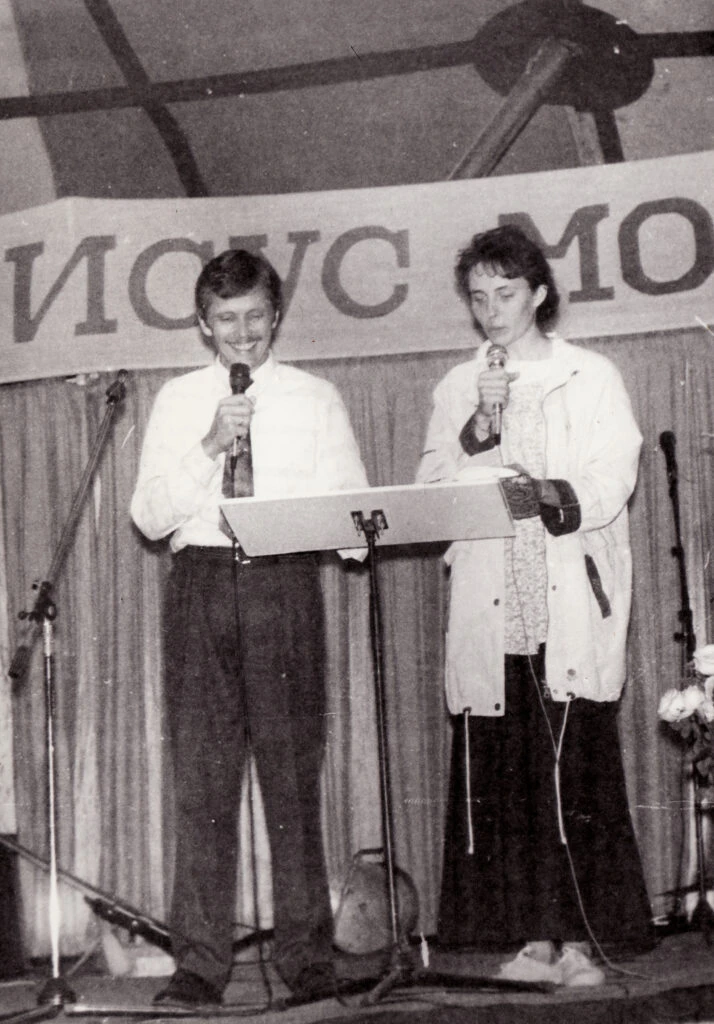
After a while I joined the ministry and for the next 19 years I actively practiced my English as a translator. At that time there was a great need for Christian translators. God did a miracle: one day I could not understand anything in English, and the next day I understood everything! Soon I started translating for my brothers and sisters, the mission was international, with believers from Belgium, USA, Italy, France, Spain, Holland, and volunteers from Canada and other countries.
So when we talk about cross-cultural relationships, we not only had different nationalities, food, beliefs and cultures, but it was a collision of two completely different worlds.
On the one hand, there was a collapsed, rotten Union, people were lost in time and new circumstances. They were exposed to both truth and lies: Kashpirovsky (a popular Ukrainian psychotherapist who claimed to be a hypnotist and a psychic healer), Hollywood movies and a completely different reality.
On the other hand, there were people from developed, democratic countries who, with all their freedom and prosperity, spoke of the need to seek God, of His love and compassion.
Suddenly, God was not a gray-haired old man throwing lightning from the sky at all sinners, but a loving Savior and Friend.
Saying it was a revolution in consciousness, mindset, and heart is an understatement. It was like the highest wave that washed away the old and gave hope.
If there is one foundation, one love, one purpose, the difference in cultures loses its weight and meaning.
How did you come together?
Nothing was ever easy for us. It was never boring. I repented and came into the ministry almost immediately, I was learning on the road, everything was new, including my walk with God and my lifestyle. From a homebody, I “retrained” as a missionary, living in a tent city, in trailers, moving from city to city, evangelizing on the streets.
Around this time that I began to feel for my future husband, but it was difficult and untimely. I remember making a list of the pros and cons of a relationship with Henry because he also began to feel strongly about me.
In his case, he immediately decided that I was his other half. He didn’t hesitate, he stuck to his decision. I once asked him why he loved me, and he said he loved me for my beautiful eyes and my intelligence.
And I was hindered by the fact that I had no idea what a real family should look like. The first example of a proper relationship I saw in the ministry was when I observed families and their children.
In addition, the mission had certain rules for developing relationships, so he proposed to me only after 2 years. And it was right, because during that time I saw what he was like in everyday life, in his ministry, with other people, with children, at work and in church. And I myself “grew up” spiritually, I realized that it is not only about living together: we will serve together, that is another important point.
Not looking at each other, but looking in the same direction, going in the same direction. Not everyone can do that.
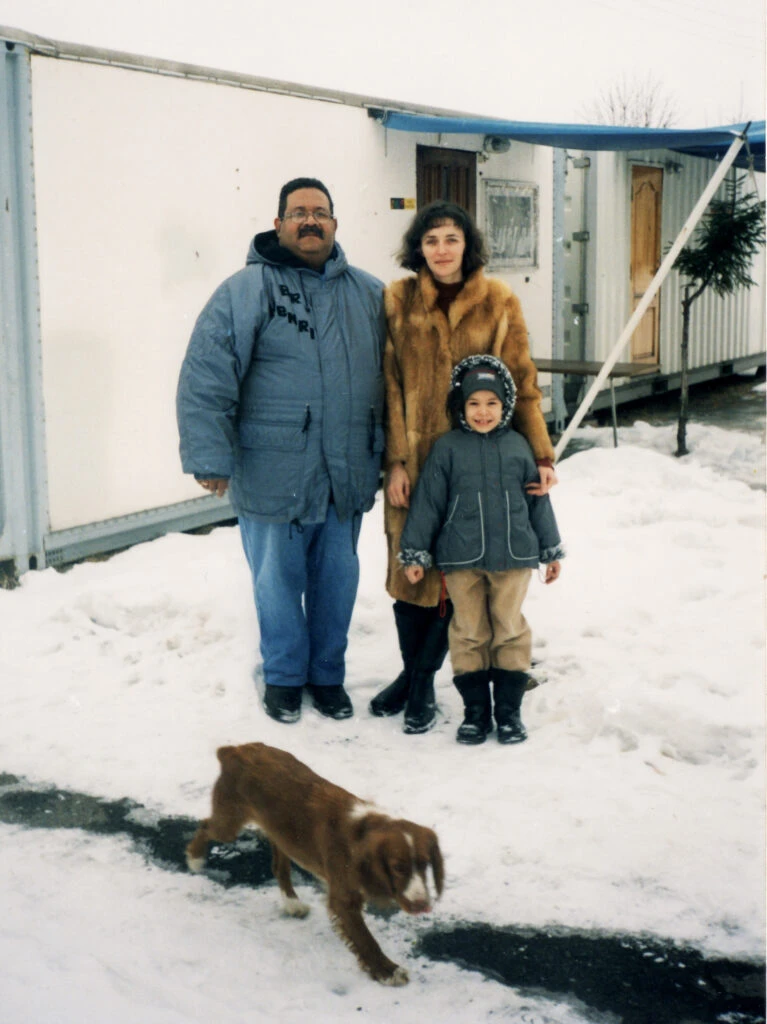
There was another interesting moment. I began to have health problems, had to be examined before the engagement, and the doctors surprised me with the high probability of my infertility. When I told Henry, he just replied that he had already bought a children’s Bible. And that was it, the question was closed. Yes, we have a daughter. Another miracle.
How did you receive the proposal?
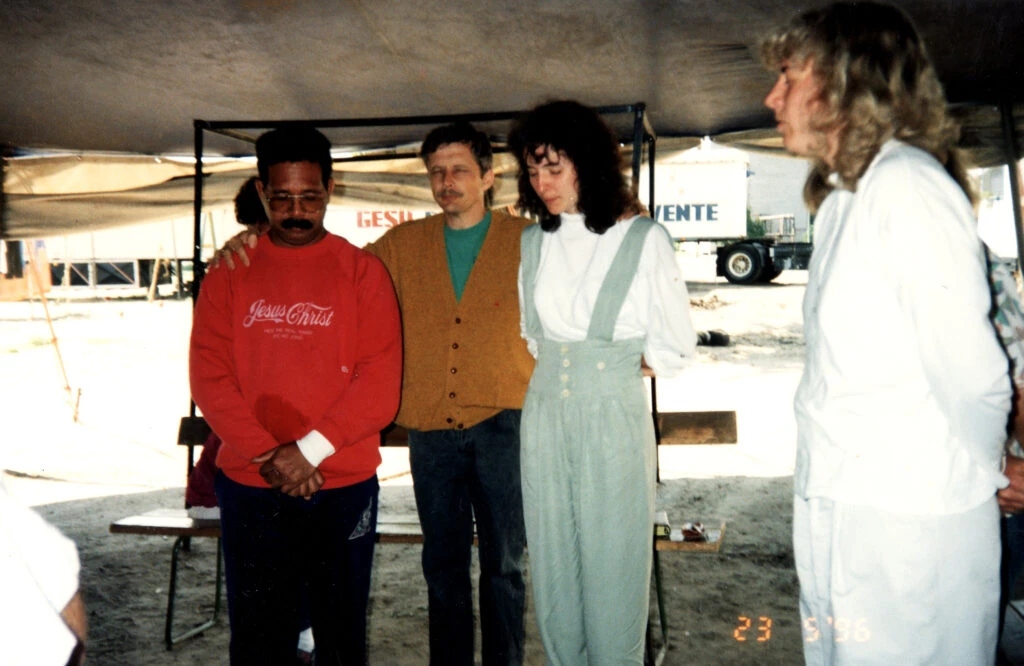
The proposal was simple, I was given a choice, confessed my feelings and said yes. Everything was clear before, the proposal was more formal. According to the rules of the mission.
But the engagement was famous. It was very American. The official announcement was made at the morning service, and by noon Henry had set a table in the center of the tent city, cooked dinner himself, bought flowers and a ring. It was wonderful. The money for this also miraculously appeared in 1996. And on the same day, the humanitarian aid with the clothes happened to contain the most delicious cookies, so we celebrated the holiday with the whole group.
In the evening, we went to the negotiation office, called Venezuela, and told Henry’s family, including mine.
For a legal marriage, we needed a document from Venezuela stating that Henry was free to marry. And so it “coincided” that one of the employees of the Venezuelan embassy in Moscow went to Caracas at the right time, lived near Henry’s family, was able to pick up the necessary document, brought it to Moscow, and then miraculously, without getting lost, the letter reached us in Ukraine.
Missionaries came from Italy and “accidentally” delivered a wedding dress for a bride in Ukraine that fit me perfectly.
My foot size is far from Cinderella’s. I used to joke that in my case, the prince found his princess because they had the same foot size.
When Henry legalized his documents in Kyiv, he “accidentally” went to a small shop where he found the right pair of shoes. “I found the shirt and jacket in humanitarian aid, we were able to buy the bow tie and shiny shoes, and a friend lent me the white pants. The groom looked his best.
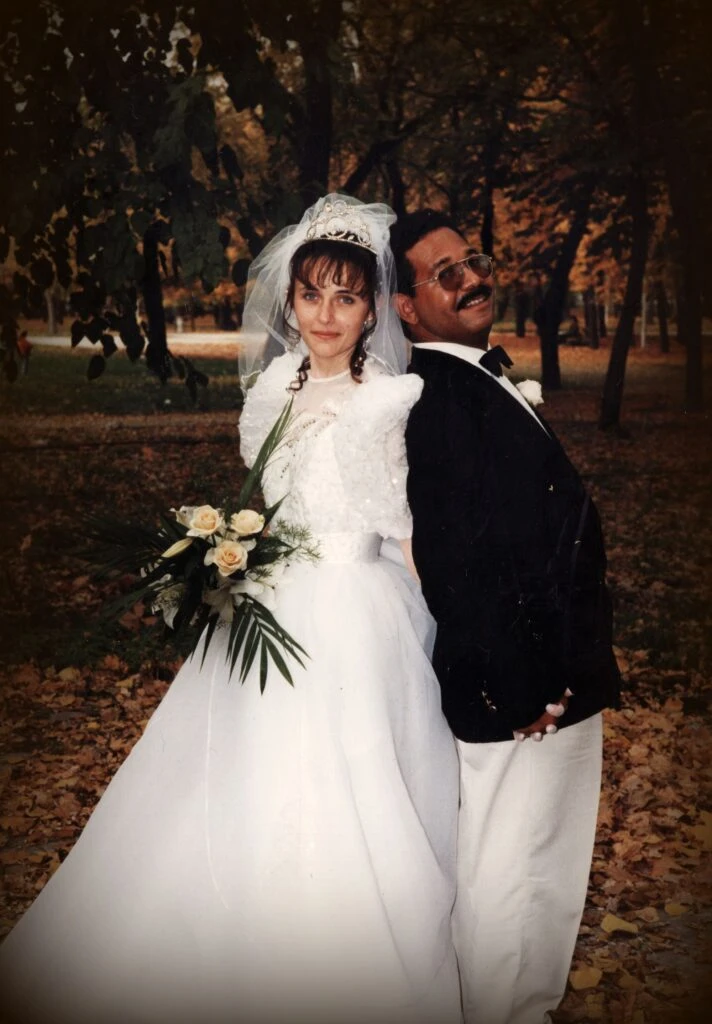
The wedding took place in Dnipro, and for the ceremony we had to go to Kherson, where I was registered.
In 2002, we were blessed with the finances to travel to Henry’s homeland, as he hadn’t been there since 1985.
The climate is eternal spring: sea, mountains, verdant, sun, houses of all styles and colors, cheerful and very friendly people of various nationalities. It was another world, another planet, but somehow everything became close and dear, I felt at home.
And I was not at all mortified by the fact that during our vacation there was a coup, they tried to overthrow the president, there was shooting, the situation was tense and life-threatening.
We returned to Ukraine three months later, Henry became the head of the mission, and for the next 10 years I dreamed of going back to Venezuela.
In 2012 we came there to stay.
How did you develop your relationship considering the difference in mentality?
I think the most difficult thing in developing the relationship was not the difference in culture, but the lack of experience in normal family relationships. It is not easy to be a wife and a mother at the same time while being active in ministry.
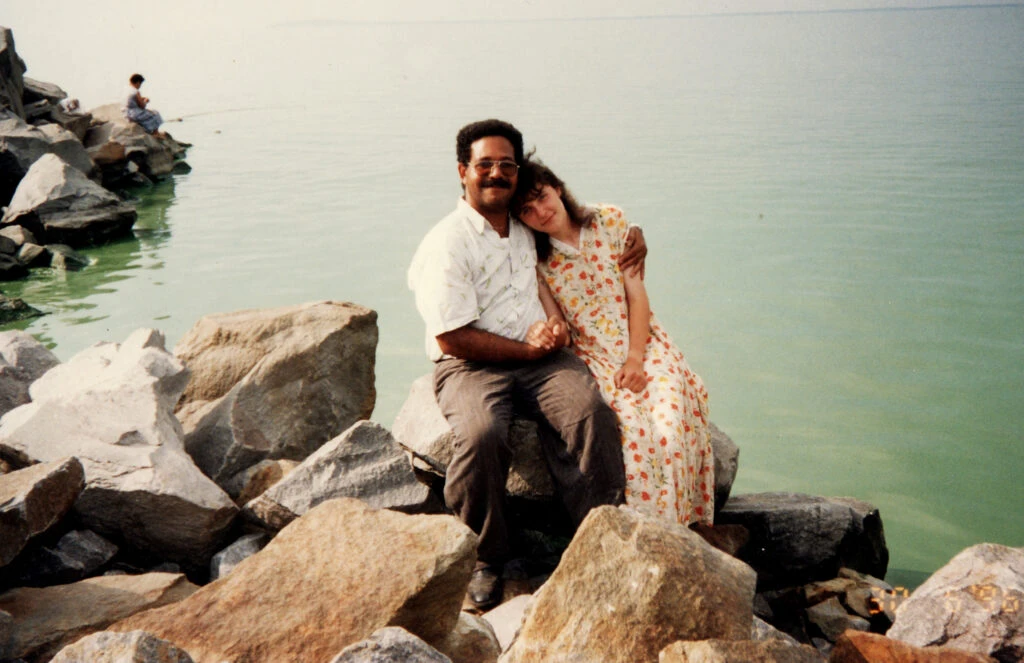
Especially at first. It helped that Henry is a very patient man. He does not criticize, does not compare, is always positive and never gets upset. He gave me the opportunity to be myself and to grow as I overcame challenges. These are personal qualities and his mentality is one of quiet hope. Mine is hide and seek, everything is lost (laughs).
Yes, I often panic over trivial things, especially when it comes to the health and safety of people close to me, but in serious situations I become like a flint.
We have learned to soften the sharp moments and take turns supporting and helping each other. When I am weak, he is strong and vice versa.
What do you think is most important in developing intercultural relationships?
Trust, loyalty and patience, if we talk about after marriage. The ability to compromise on the little things and insist on the important things.
But a lot of things need to be worked out before marriage. Not being afraid to ask questions about anything. Find out your future spouse’s principles and views on basic issues of faith, marriage, childbirth, ministry, sharing of resources, etc.
No one gives guarantees in marriage, but with God’s help we can greatly reduce the risk of disaster. Seeking counsel from wise people is also an option, but there are few of them.
By the way, since I was young, I dreamed of a man like Arnold Schwarzenegger. Henry is his exact opposite. I’m talking about this as an illustration: don’t miss your soul mate by relying on an artificially created image of an ideal man.
First of all, you have to know for yourself what you can and cannot compromise on. For me, for example, loyalty to me, loyalty to service, loving children, sacrifice, and the absence of greed and selfishness were important.
The rest you can learn to live with. But is this only a matter of intercultural relations? This world has long become homogeneous, losing uniqueness and cultural differences, and bringing character and response to difficult circumstances to the fore.
What obstacles have you encountered in developing a relationship with a man from another culture?
I am used to planning ahead and saving money. My mother always had a bag of flour, salt, and sugar. The genetic code of those who survived the war and the Holodomor.
Venezuelans live more simply – today we have money, so we spend it. Tomorrow we will see.
We look for depth in every puddle, in every glance, and find hidden messages between the lines. Venezuelans are simple and transparent, they perceive everything without filters and attitudes. They tell it like it is, without pitfalls.
We don’t smile to strangers; there is an expression here, “face like a cannon,” which applies to us. I have often been asked why Slavs don’t smile. And I understand that with our serious faces we build a barrier for strangers, we put up a sign “keep away”, only drunks and crazy people smile on our streets (I am talking about the time of my youth).
Here everyone is friendly and smiling, the shopkeepers call me “dolly” and “queen”.
Personally, the hardest thing for me was the complexity of my perception of life and the ease with which Henry treats everything. I still grumble when he spends money on sweets or things he doesn’t really need, and I turn on the economy mode, but I realize that I need to relax too.
I should also mention the language of communication. In Ukraine we spoke English, in Venezuela we spoke Spanish, and Henry understands Russian and Ukrainian well and can interpret some nuances. But you have to be careful with the language because there can be misunderstandings.
What is the country’s attitude toward marriage?
In the 80s, women in Venezuela did not have full rights, not even over their children. A lot has changed since then. Women’s rights are really protected, and women can stand up for themselves, work and raise children, often without the help of men. The institution of civil marriage is enshrined in law, which means a banal cohabitation, but with rights to property and children. Abortion is forbidden. There are many young single mothers with many children.

“From what I see around me, women are mostly responsible for everything. They carry everything on their backs. The men are happy with this situation. There are a lot of parasites who jump from relationship to relationship, leave children and don’t really care about them. There are wonderful fathers. But I think they are in the minority. Women don’t insist on marriage.
Tell us about the family traditions of his culture that you had to accept.
When we get together for a holiday, whether it’s Christmas or a birthday, the music is turned up and we try to communicate by yelling at each other, dancing a lot and eating very little. They don’t like to say “no,” they don’t refuse, but they often don’t keep their promises. They do not hide the delicate details of other family members’ lives. I am more reserved. I never criticize my husband or my daughter.
What traditions have you been able to implement in your family?
Quiet family holidays. Borsch as a delicacy. Bread. It is not as popular here as corn tortillas. My husband and I are like the strings of a guitar, we sound different but harmonious, and we have never had to ” implement ” anything.
What differences have you noticed between you in your daily life?
Cleanliness and order are important to me. I can’t have guests if the house is not in good condition. For Henry, and in general in Venezuela, comfort is more important than order. But now we have found a balance. We’re pushing the limits, especially since not everything can be organized due to lack of funds. We have to make choices.
Henry is more sociable, and it’s harder for me to build relationships with new people, but we find a compromise.
On the other hand, Henry has no problem washing dishes, buying groceries, and cooking dinner, while I have no problem screwing down doors and unclogging pipes. If there is such a need.
How do you raise children in this culture?
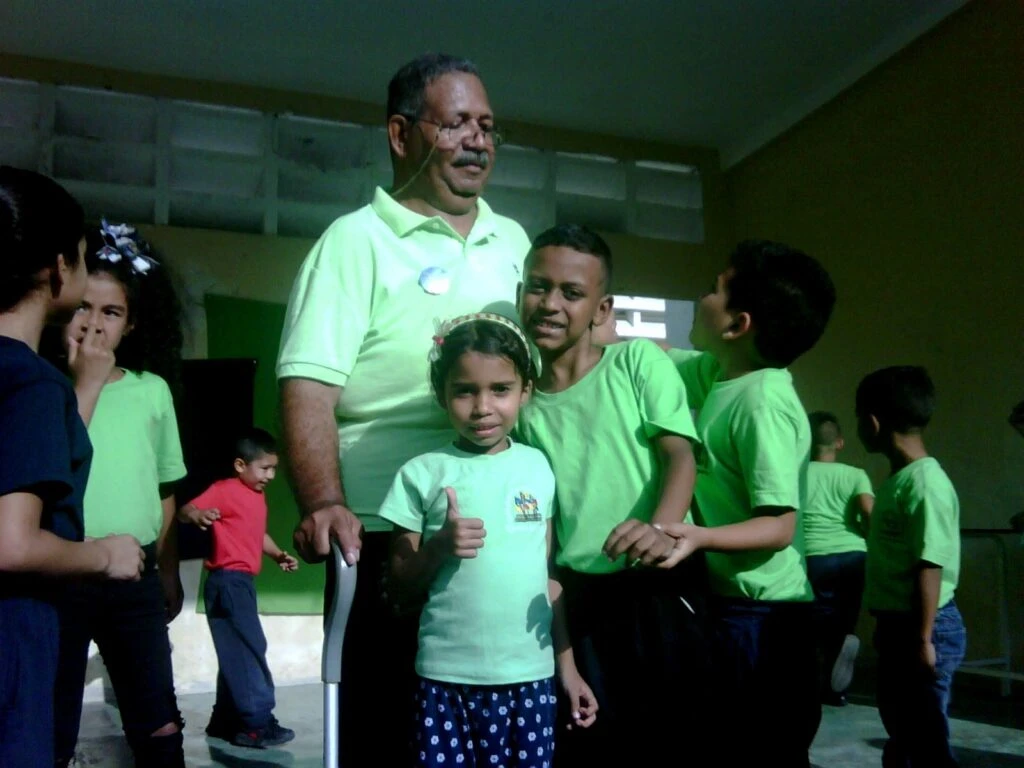
Kids are little princes and princesses here. Children eat first and foremost. They get the best of everything. They are allowed to be children – to make noise, to cry, to play.
They are wanted, there are practically no orphanages. I really like that all the children, big and small, say to their mother, grandmother or aunt when they leave the house: “Bless me!” And they reply, “May God bless you!”
What do the locals eat?
There is food and drink for every taste. There are many exotic fruits and familiar vegetables. South America is where the potato came from, and I love eating potatoes.
It’s also great that the fruits and vegetables are fresh all year round, so you don’t have to pick them. Venezuela is a mix of cultures and cuisines from many different countries. At one time, refugees from Italy, Portugal, Spain and even Japan hid here. All this influenced the Venezuelan cuisine.

At Christmas, people here eat ayacas, a corn porridge stuffed with meat and other ingredients and wrapped in maple leaves. Ayacas is boiled and eaten with a salad similar to our olivier, baked pork, and a roll of ham, olives, and raisins.
You owe me a recipe for one of the national dishes.
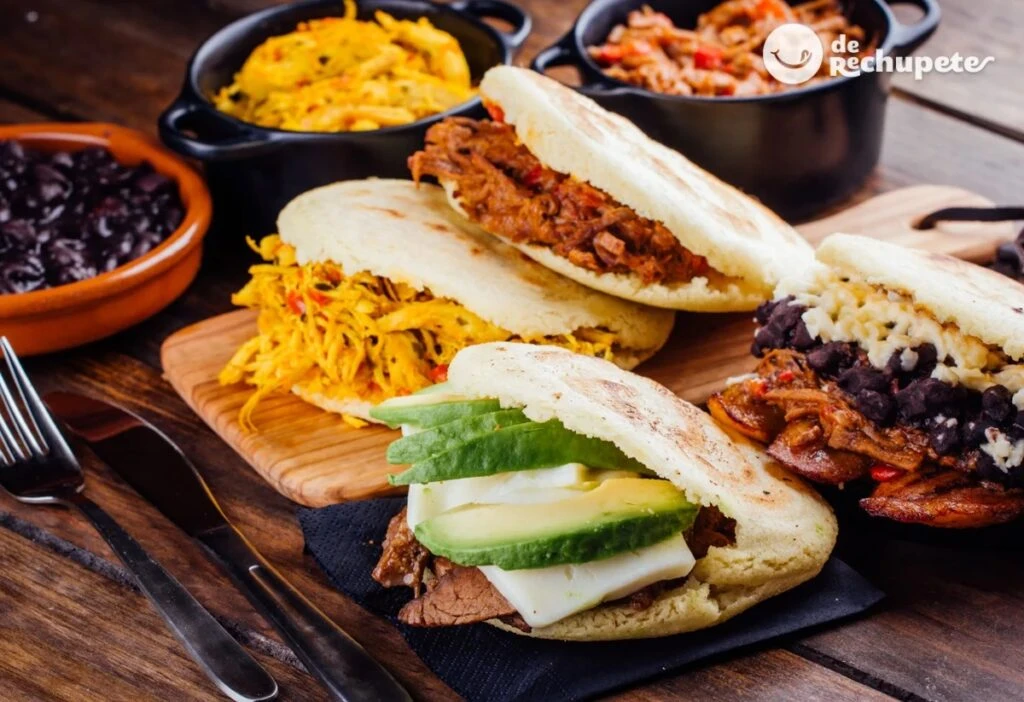
A classic of Venezuelan cuisine is the corn tortilla “arepa” with a filling. There are different fillings – meat, avocado, eggs, cheese. The flour is special. Not the same as in Ukraine. Here it is made from pre-cooked corn. It is mixed with water and baked in a flat cast-iron pan. We cut it in the middle and fill it with whatever we want. Another favorite dish is white rice, beef, black beans and fried sycamore.
How does serving together affect family relationships?
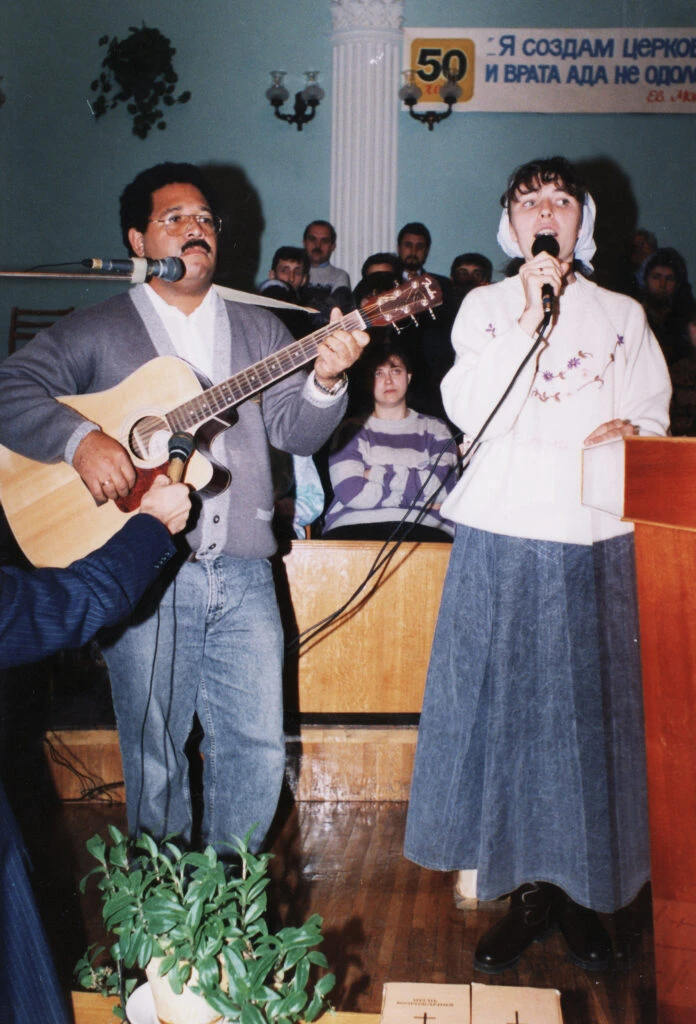
This is the best thing that could have happened to us. Doing the same thing but in different directions has made us a strong and effective team. I recommend it to everyone. We both sing and play, I’ve translated Henry’s sermons for many years, accompanied him everywhere, we’ve sung together, in short.
Are you ready for your children to enter into intercultural marriages?
Of course I am. As I already mentioned. The world has shrunk to the size of a village, the Internet and the ability to travel have shifted borders. The main thing is to find your own person. It is not easy to find someone with whom you can go all the way, overcome obstacles, find the joy of communication, and keep the love alive through the years. If you remove the obstacle of a different language, nationality or citizenship from the task, there are more opportunities.
I used to think it was interesting to see other countries, but the real treasure turned out to be meeting other people, finding friends on the other side of the globe, the horizons become endless, the boundaries are broken, a new colorful world opens up. I grew up in a closed country and now I know the value of freedom, especially freedom of communication. Learn foreign languages even in your old age.
What is the traditional approach to parents in this country?
Respectful, towards the elderly in general. Parents are valued and taken care of. People here live long and look good, trying to be active at every age.

It should be noted here that I grew up in a family with an alcoholic father, and there were scandals both before and after my parents’ divorce; downstairs lived a recidivist who attacked my mother with a knife and broke my father’s head, and next door lived neighbors on the playground who drank and organized scandals and fights almost every night. Therefore, since childhood, when I hear conversations in high tones, a defense mechanism is triggered and anxiety increases. Later, I realized that this is the way people talk here. Of course there are arguments, and it seems as if they have argued to pieces, but the next day everyone communicates as if nothing had happened, they just let off steam.

Venezuelans are happy and unambitious, they make promises easily and do not keep them; they say “tomorrow” and tomorrow can come in a week, a month or a year. They love holidays, good food, beautiful clothes, jewelry and shoes. And if it were not for the economic and political crisis, they would never leave their country; they are patriotic and attached to their families. Therefore, everything that happens after the arrival of the builders of socialism is a real disaster for them. Families and the usual way of life are destroyed, and many are forced to seek happiness abroad. This is a different mentality; a whole generation has grown up that does not know the carefree life their parents remember.
Crime is a pressing issue. People are always on the lookout for motorcyclists, thieves, and bandits. Many guns are in the hands of bandits. People do not trust the police at all.

I asked Henry if we have any problems because we belong to different cultures. And after thinking about it for a while, he said that there are none at all. That there are purely human qualities that we face and that the only difference between us is a different flag and anthem.
Thank you for the conversation.
CITA Ministry Press Center.